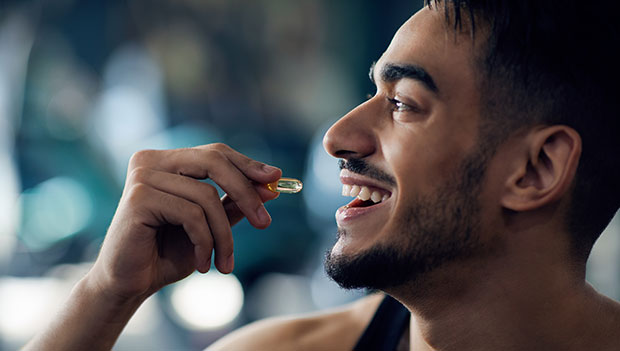
By clicking on the product links in this article, we may receive a commission fee at no cost to you, the reader. Sponsorships and affiliate commissions help support our research so we can help you find the best products. Read the full affiliate disclosure here.
Some people are surprised to learn that the human gastrointestinal tract naturally has abundant bacteria that help support your stomach, as well as your small and large intestines. These groups of bacteria are vital for health and help with functions such as digestion and immunity. The best probiotics for men include the type of bacteria that’s good for your gut and comes in the form of a supplement.
But starting a probiotic can be intimidating—after all, there are seemingly hundreds of options to pick from. In this guide, we’ll break down 10 of our favorite probiotic options for men as well as the benefits of probiotics, where to find them in food, and what to consider when choosing the best probiotics for men.
Why Trust Us?
The health and safety of ACTIVE's readers is of the utmost importance to us. To ensure your well-being when consuming dietary supplements, the ACTIVE.com editorial team prioritizes products that are independently tested by a third party. We've consulted with a team of nutritionists and dieticians to ensure the products we feature are of the highest standard. This helps us create the most accurate, authentic review content for our readers.
The Best Probiotics for Men - Our Top Picks
- Ritual Synbiotic
- Swolverine Probiotics
- Transparent Labs Gut Health Formula
- Kaged Probiotic
- Optimum Nutrition Prebiotic+Probiotic
- Onnit Total Gut Health
- Ancient Nutrition SBO Probiotics
- Performance Lab Probiotic
- GNC Probiotic Complex
- Ora Trust Your Gut
Ritual Synbiotic+
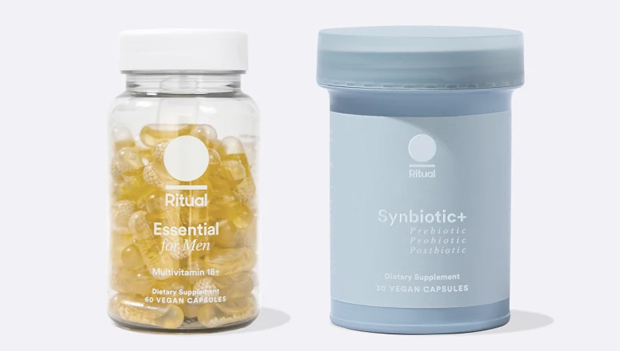
SPECS
- Ingredients: Lactobacillus rhamnosus, Bifidobacterium animalis ssp. Lactis, Tributyrin, Preforpro prebiotic blend, Stomach acid-resistant outer vegan capsule (hypromellose, gellan gum), inner vegan capsule (hypromellose), coconut medium-chain triglyceride (MCT) oil, silica, cellulose
- Dosage: 1 capsule
- Price: $$
- Form: Capsule
- Dose: 1 capsule
The Ritual Synbiotic+ supplement contains both prebiotics and probiotics, plus an ingredient they refer to as a postbiotic.(1) Tributyrin is the postbiotic used. It is intended to provide fuel to the cells in the colon, which helps promote a healthy gut environment.
The Ritual Synbiotic+ contains 11 billion CFUs in one capsule and includes two well-studied strains of probiotics. These strains have the potential to decrease bloating, gas, and diarrhea.
This supplement does not require refrigeration and can be taken at any time of the day, with or without food. This supplement is gluten and major allergen free and non-GMO.
What We Like
- Contains prebiotics, probiotics, and postbiotics in 1 capsule per day(2)
- Third-party tested
- Comes in a moisture-controlled bottle to protect the capsules and the probiotics inside
What We Don't Like
- Requires a subscription, though your subscription can be canceled, and shipments can be delayed at any time
BUY: Ritual Synbiotic
Swolverine Probiotix
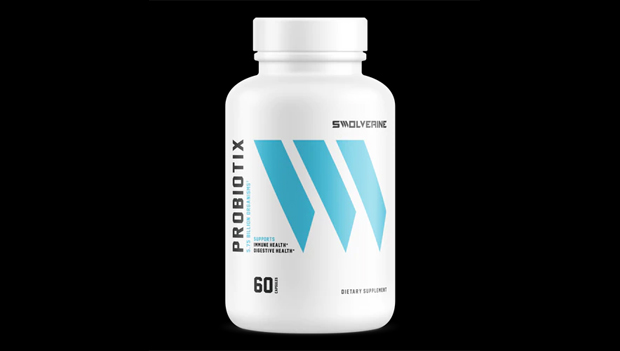
SPECS
- Ingredients: Bacillus subtilis, Lactobacillus rhamnosus, Lactobacillus casei, Bifidobacterium longum, Lactobacillus acidophilus, Lactobacillus plantarum, Bifidobacterium breve
- Dosage: 1 capsule
- Price: $
- Form: Capsule
The Swolverine Probiotix contains 5.75 billion CFU from seven different probiotics: Bacillus subtilis, Lactobacillus rhamnosus, Lactobacillus casei, Bifidobacterium longum, Lactobacillus acidophilus, Lactobacillus plantarum, and Bifidobacterium breve. This supplement is non-GMO, gluten-free, soy-free, and made in the United States.
The label suggests the supplement could be kept refrigerated to maximize its potency, but refrigeration isn't explicitly required. This supplement should be taken with food or with a meal.
What We Like
- Contains 7 different types of probiotics
- Bacillus subtilis, DE111, has an associated research study
What We Don't Like
- Unclear to what extent the product degrades if not kept refrigerated
BUY: Swolverine Probiotix
Transparent Labs Gut Health Formula
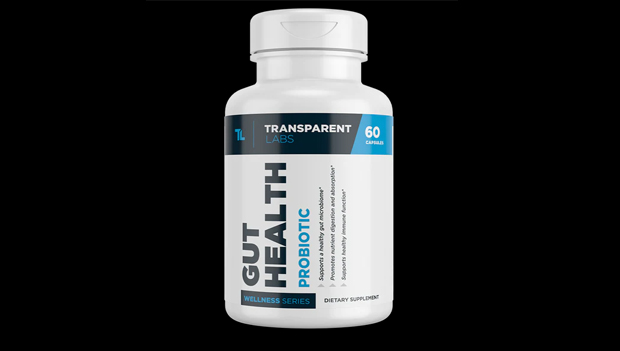
SPECS
- Ingredients:10 strains of probiotics, including Lactobacillus acidophilus and Bifidobacterium lactis, 100mg inulin fructooligosaccharide powder, Non-GMO Maltodextrin, Hypromellose capsule
- Dosage: 2 capsules
- Price: $$
- Form: Capsule
The Transparent Labs Gut Health Formula contains 100 billion CFUs per serving from 10 different strains of probiotics. This supplement also contains 100 milligrams of fructooligosaccharides powder, which is a type of prebiotic.(3)
It is gluten-free, non-GMO, and vegan. This supplement is also free from artificial sweeteners, colors, and preservatives. The supplement label recommends taking two capsules per day with a full glass of water, preferably on an empty stomach.
What We Like
- Contains both prebiotics and probiotics in the same supplement
- Contains 100 billion CFUS from 10 different strains of probiotics
What We Don't Like
- Mentions clinical benefits of probiotic strains, but unclear if research supports taking these strains in combination (4)
BUY: Transparent Labs Gut Health Formula
Kaged Pro-Biotic
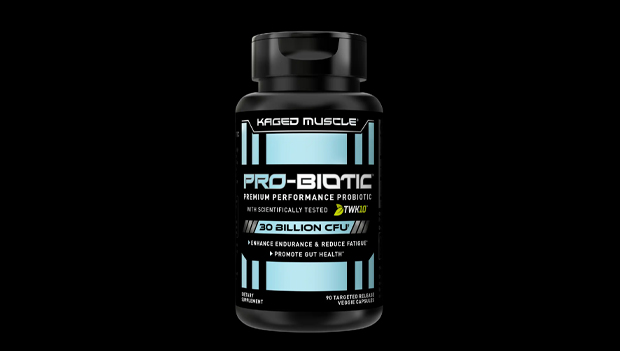
SPECS
- Ingredients: L. plantarum, calcium, dicalcium phosphate, delayed-release vegetable capsule, cellulose, magnesium stearate
- Dosage: 1 capsule
- Price: $
- Form: Capsule
Kaged is a well-known supplement brand with very clean and high-quality products. Their Pro-Biotic blend delivers 10 billion CFUs of L. Plantarum per serving as well as 102 milligrams of calcium, which may help improve your bone health and reduce fatigue.
Their patented TWK10 supplement is especially geared toward athletes to help improve their endurance and reduce muscle soreness, enabling them to train longer and push harder.
What We Like
- Clean ingredients and no artificial additives
- Patented supplement formula that enhances endurance and performance
- Targeted-release technology
What We Don't Like
- Only 1 strain of probiotics so it might not help with some gut health issues for a variety of people
BUY: Kaged Probiotic
Optimum Nutrition Prebiotic + Probiotic
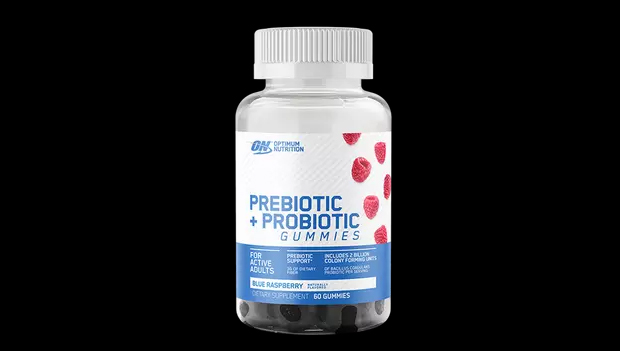
SPECS
- Ingredients: Bacillus coagulans, Inulin, pectin, sugar, citric acid, natural flavor, sodium citrate, fractionated coconut oil, carnauba wax, fruit juice concentrates, corn starch
- Dosage: 2 gummies
- Price: $
- Form: Gummy
- Dose: 2 gummies
The Optimum Nutrition Prebiotic + Probiotic comes in a blue raspberry flavor. This probiotic and prebiotic blend comes in gummy form versus the capsules that most probiotics are packaged within. This supplement contains two billion CFUs of Bacillus coagulans per two gummy servings.
In addition to probiotics, this supplement also contains prebiotic fiber from inulin and some additional dietary fiber from pectin. This product is soy-free, vegetarian, and dairy-free.
What We Like
- Gummy form, while most probiotics are in capsule form
- Contains 3g of dietary fiber per 2 gummy serving
What We Don't Like
- Only contains 1 strain of probiotics
BUY: Optimum Nutrition Prebiotic+Probiotic
Onnit Total Gut Health
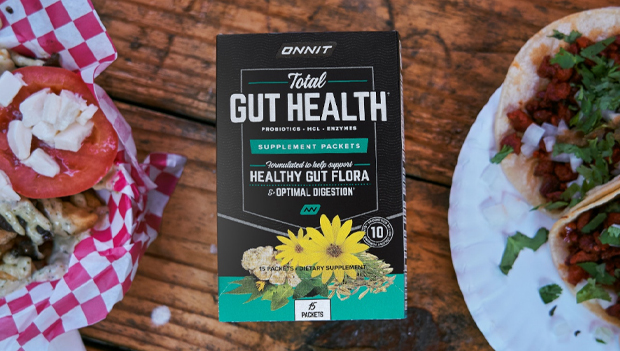
SPECS
- Ingredients: Lactobacillus acidophilus, Lactobacillus rhamnosus, Bifidobacterium infantum, Bifidobacterium lactis, Lactobacillus Plantarum, 2 types of prebiotic fiber, a gut-friendly yeast, digestive enzymes, betaine HCL
- Dosage: 7 capsules
- Price: $$$
- Form: capsules
- Dose: 7 capsules
Onnit Total Gut Health supports total gut health and comes in packets of seven capsules to take daily. The contents of the seven capsules include 10 billion CFUs from five strains of probiotics, a digestive enzyme blend, a gut-friendly yeast, and two types of prebiotic fiber.
This supplement packet is dairy-free, soy-free, vegan, keto-friendly, and caffeine free. It should be taken with a large meal. The label suggests storing this supplement in a cool, dry place.
What We Like
- Contains many ingredients to support gut health, including digestive enzymes and both prebiotics and probiotics(5)
- Company offers a 15% off subscribe and save option with a subscription
What We Don't Like
- 7 capsules is a large pill burden to take daily
- Most costly of the probiotic supplements we reviewed
Ancient Nutrition SBO Probiotics
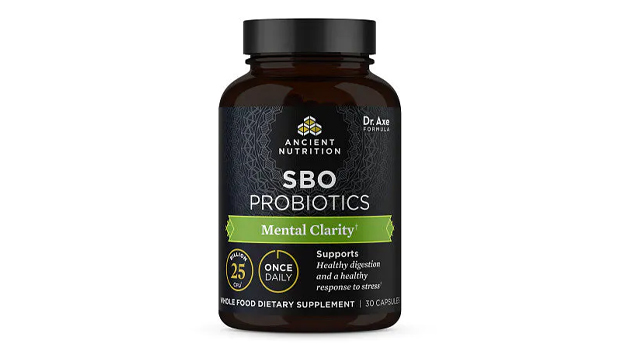
SPECS
- Ingredients: Bacillus coagulans, Bacillus clausii, Bacillus subtilis, Saccharomyces boulardii, Ashwagandha Root and Leaf Extract, Organic Lion's Mane Mycelium, Organic Fermented Brahmi Leaf, Organic Apple Cider Vinegar
- Dosage: 1 capsule
- Price: $
- Form: Capsule
- Dose: 1 capsule
The Ancient Nutrition SBO Probiotics supplement provides 25 billion CFUs per 1 capsule serving and contains three strains of probiotics and one strain of yeast. The supplement label suggests taking this probiotic on an empty stomach with a glass of water, either in the morning or before bed in the evening.
The Ancient Nutrition SBO Probiotics capsule is suitable for people with dietary restrictions. It is keto and paleo-friendly, gluten-free, and free of nuts, dairy, and soy. This supplement does not require refrigeration.
What We Like
- Some consumers will like that this supplement contains a superfood blend that may provide extra benefits with extracts from ashwagandha root, apple cider vinegar, and a type of mushroom(6)
- More affordable price point than many probiotic supplements
What We Don't Like
- Product website has many health promotion claims, but it's unclear if any research has been done on this supplement or combination of ingredients in particular
BUY: Ancient Nutrition SBO Probiotics
Performance Lab Prebiotic
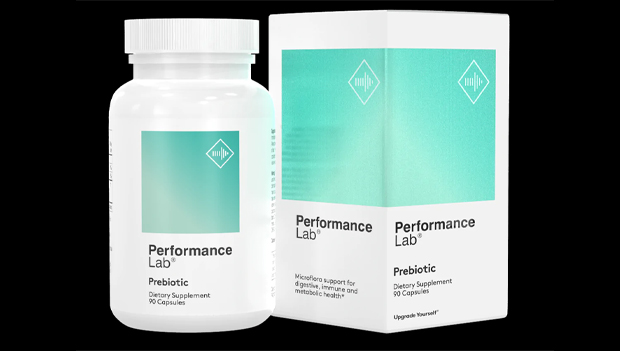
SPECS
- Ingredients: Inulin from chicory root fiber, pullulan from tapioca starch
- Dosage: 3-6 capsules per day
- Price: $$
- Form: Capsule
The Performance Lab Prebiotic does not contain probiotics but instead seeks to boost the health of the bacteria already in a person's gut with prebiotics. The prebiotic sources are primarily inulin from chicory root fiber, though the capsules also contain some prebiotic fiber because they're made from cultured tapioca starch.
This supplement is suitable for vegetarians and vegans, non-GMO, and caffeine-free. It is free of the top allergens, including soy, eggs, fish, shellfish, dairy, peanuts, tree nuts, and wheat.
What We Like
- The capsules are made from cultured tapioca starch and provide a second type of prebiotic fiber
- May help create a healthier environment in the gut for good bacteria
- Suitable for people with special diet considerations such as food allergies or vegetarianism
What We Don't Like
- 6 capsules are recommended per day, but taken at 2 different meals, which might not be realistic for many people
- Costly, especially since it only contains prebiotics and no probiotics
BUY: Performance Lab Probiotic
GNC Probiotic Complex
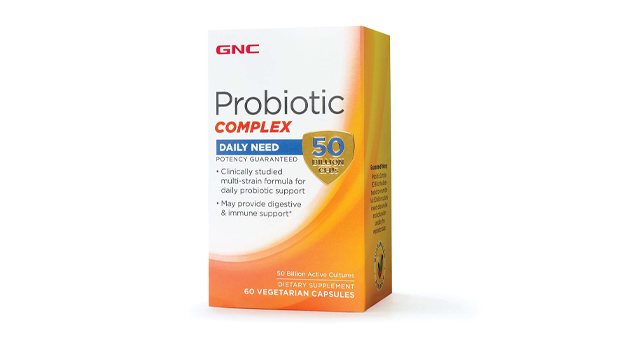
SPECS
- Ingredients: Lactobacillus Acidophilus, Bifidobacterium animalis subsp. Lactis, bifidum, Fructooligosaccharides
- Dosage: 1 capsule
- Price: $$
- Form: Capsules
- Dose: 1 Capsule
The GNC Probiotic Complex comes in capsule form and does not require refrigeration. One capsule contains 50 billion live active cultures from multiple strains of probiotics and has been tested to ensure it contains the full amount of cultures when used by the expiration date. This supplement also contains 150 milligrams of fructooligosaccharides, a type of prebiotic fiber used by probiotics for fuel in the gut.
In addition, this supplement is gluten and lactose-free. The directions state to take one capsule daily with food, but that one additional capsule could be taken per day for "extra support" if desired.
What We Like
- From a well-known supplement brand
- No refrigeration necessary
- Contains a prebiotic in addition to active probiotics
What We Don't Like
- Contains several filler ingredients such as microcrystalline cellulose, silica, titanium dioxide(7)
Ora Trust Your Gut
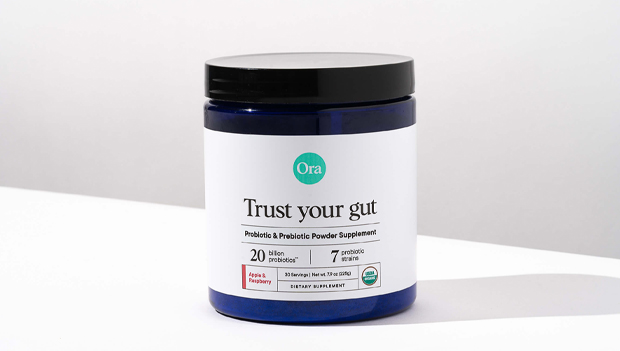
SPECS
- Ingredients: Lactobacillus acidophilus, Lactobacillus plantarum, Bifidobacterium lactis, Lactobacillus reuteri, Bifidobacterium bifidum, Bifidobacterium breve, Bifidobacterium longum, Prebiotics from inulin and tapioca
- Dosage: 1 scoop (7.5g)
- Price: $$
- Form: Powder
The Ora Trust Your Gut probiotic comes in powder form and contains 20 billion combined CFUs of its probiotic strains. This product is available in two flavors: lavender lemonade and apple raspberry. This supplement's instructions suggest mixing it with water or adding it to a smoothie or oatmeal, though you are supposed to ensure you take it with food.
This powder is free of gluten, dairy, soy, tree nuts, and added sugars. It is also USDA-certified organic, vegan, non-GMO, and made without artificial flavors, colors, sweeteners, or preservatives.
What We Like
- Powder form may be an easier way to incorporate a probiotic into your diet
- Every batch is third-party tested, and products can withstand heat during shipping
What We Don't Like
- Though there are two flavors available, taste fatigue is possible with an oral product you have to consume mixed into a liquid or food daily
BUY: Ora Trust Your Gut
What Are Probiotics?
Probiotics are defined by the International Scientific Association for Probiotics and Prebiotics as "live microorganisms that, when administered in adequate amounts, confer a health benefit on the host".(9) These microorganisms are typically bacteria but also can include yeast.
Probiotics are often thought of as "good" bacteria versus "bad" bacteria that can cause illnesses or infections. Not all types or strains of probiotics have proven health benefits, but research is ongoing in this area.
Prebiotics are often mentioned when discussing probiotics. While probiotics are bacteria, prebiotics is a type of dietary fiber that bacteria in the digestive tract uses as fuel.(10) When both prebiotics and probiotics are in the same product, they can have a synbiotic effect with greater benefits.(11)
So, where can you find probiotics naturally? Probiotics are naturally found in many fermented foods. Fermentation is a type of food processing that was historically used to preserve foods without refrigeration.(12)
Benefits of Probiotics for Men
According to the National Center for Complementary and Integrative Health, the potential benefits of probiotics are vast and they can help with everything from improving one’s gut health and strengthening their immune system to improving their performance in the gym.
May Help Improve Gut Health
Probiotics help the body balance out its gut flora and replenish the good bacteria in the gut. This reduces inflammation, helps the intestines recover, strengthens the intestinal walls, and promotes better bowel movements so you’re not fighting constipation or diarrhea.
And even more so when it comes to antibiotic-associated diarrhea which often occurs as a complication of antibiotic use and can be detrimental to gastrointestinal health.(13) Taking a probiotic while using antibiotics is one of the best ways to prevent those negative consequences and preserve gut health.
Additionally, these beneficial bacteria help promote better and more efficient food breakdown which in turn helps enhance nutrient absorption and allows the body to intake more minerals, vitamins, and other important nutrients to build the body.(14)
May Aid in Enhancing the Body's Immune System
So much more than just beneficial bacteria that help digest food and absorb nutrients, probiotics help decrease inflammation and with it, strengthen the body’s immune system.(15) Plenty of supplement brands nowadays add other beneficial ingredients and superfoods to their formulas that only enhance the effect of probiotics, helping them fight off viruses and bacteria, all while protecting overall health.
With it, probiotics can help in the prevention and healing of plenty of different diseases, from IBS and ulcerative colitis to periodontal disease and autoimmune conditions.(16)
May Help Improve Athletic Performance and Endurance
Some brands take their supplements to another level and knowing how the vast majority of men like working out and improving their performance, they work on enhancing their formulas to help them train longer, faster, and with less fatigue. That’s where specific strains of probiotics like L. Plantarum comes into play, with a variety of studies to back up their claims.(17)
More research is needed on which probiotics are truly beneficial, who should take them, and the doses that provide maximum benefits.
Food Sources of Probiotics
Examples of fermented foods include:
- Kombucha
- Yogurt
- Kefir
- Miso
- Tempeh
- Kimchi
- Sauerkraut
In addition, probiotics are added to many processed food products now, such as teas, chocolate, and snack bars.
What To Consider When Choosing a Probiotic Supplement
It's always best to check with your healthcare provider before starting a new dietary supplement. People with serious illnesses or a weak immune system should avoid taking probiotics unless they are doing so under careful medical supervision.
The World Gastroenterology Organization suggests the following factors to consider when choosing a probiotic supplement to add to your routine:
Product Safety
Probiotics made from Lactobacilli and Bifidobacterium are generally thought to be safe, though they are considered safe for people who are generally healthy currently.(18) Both types of bacteria make lactic acid and are normally found in the digestive tract of healthy adults, even without supplementation.
Dose of Colony Forming Units (CFUs)
There's no single suggested dose of Colony Forming Units (CFUs) that has been proven to be effective by research studies.(19) Over-the-counter products typically range from 1 to 10 billion CFUs per dose, which is a very broad dosage range. Some products are effective at lower levels, while some products are effective at much higher levels of CFUs. Some supplements list the amount of CFUs per strain at the time of manufacture, while others will tell you how much the product should contain closer to its final expiration date.
Quality of the Probiotic
Consider the following factors to determine the quality of a probiotic supplement: Does the product specify the strain of all probiotics within the supplement? Is there a specific shelf life indicated on the label? Are there specific storage guidelines suggested? Some probiotic supplements will be useless if exposed to heat or may lose efficacy as they draw closer to their expiration date.
Storage Guidelines
Since probiotics are made with live bacteria, they are susceptible to dying during storage. Check the supplement label to see if it indicates how long you can store the probiotic, the maximum temperature it can be stored in, and if the product requires refrigeration. If the probiotic is sensitive to heat and is stored without refrigeration, all of the probiotics may be dead before you consume them, so you'll receive no benefits and waste money.
FAQs About Probiotics for Men
What kind of probiotics should a man take?
There's not one perfect probiotic supplement for a man to take. Consider the benefits you'd like to experience, how many CFUs the product contains, whether you have to take one capsule or many per day, the storage requirements for the supplement and whether the probiotic is tested to ensure it contains what the label says it does. Probiotics containing prebiotics may be helpful, as healthy gut bacteria also need prebiotic fiber as fuel.
Should you take a probiotic every day?
Yes, if you'd like to take a probiotic, you should take the probiotic supplement every day to obtain the maximum benefits. Supplement guidelines vary, so read the label to double-check the instructions for your product. Check if the company suggests taking the supplement with food or water or on an empty stomach and how many capsules are in a recommended dose.
Is it better to take probiotics in the morning or at night?
There's no best time to take a probiotic. It's best to follow the instructions on the supplement's label, but generally, it does not matter what time of day you take a probiotic. Ideally, you would take a probiotic at whichever time of day helps you remember to take it consistently and not forget. For some people, that might be with their breakfast every day or before heading to bed in the evening.
These statements have not been evaluated by the Food and Drug Administration. This product is not intended to diagnose, treat, cure, or prevent any disease.
References
- Sanders, M. E., Merenstein, D. J., Reid, G., Gibson, G. R., & Rastall, R. A. (2019). Probiotics and prebiotics in intestinal health and disease: from biology to the clinic. Nature reviews Gastroenterology & hepatology, 16(10), 605-616
- Żółkiewicz, J., Marzec, A., Ruszczyński, M., & Feleszko, W. (2020). Postbiotics—a step beyond pre-and probiotics. Nutrients, 12(8), 2189
- Sabater-Molina, M., Larqué, E., Torrella, F., & Zamora, S. (2009). Dietary fructooligosaccharides and potential benefits on health. Journal of physiology and biochemistry, 65(3), 315-328
- María Remes-Troche, J., Coss-Adame, E., Ángel Valdovinos-Díaz, M., Gómez-Escudero, O., Eugenia Icaza-Chávez, M., Antonio Chávez-Barrera, J., ... & Solana Ortiz, R. (2020). Lactobacillus acidophilus LB: a useful pharmabiotic for the treatment of digestive disorders. Therapeutic advances in gastroenterology, 13, 1756284820971201.
- Ianiro, G., Pecere, S., Giorgio, V., Gasbarrini, A., & Cammarota, G. (2016). Digestive enzyme supplementation in gastrointestinal diseases. Current Drug Metabolism, 17(2), 187-193
- Salve, J., Pate, S., Debnath, K., & Langade, D. (2019). Adaptogenic and anxiolytic effects of ashwagandha root extract in healthy adults: a double-blind, randomized, placebo-controlled clinical study. Cureus, 11(12)
- Nsor-Atindana, J., Chen, M., Goff, H. D., Zhong, F., Sharif, H. R., & Li, Y. (2017). Functionality and nutritional aspects of microcrystalline cellulose in food. Carbohydrate polymers, 172, 159-174.
- Liu, Y. W., Liong, M. T., & Tsai, Y. C. (2018). New perspectives of Lactobacillus plantarum as a probiotic: The gut-heart-brain axis. Journal of Microbiology, 56(9), 601-613.
- National Institutes of Health, Office of Dietary Supplements, https://ods.od.nih.gov/factsheets/Probiotics-HealthProfessional/#en3
- Davani-Davari, D., Negahdaripour, M., Karimzadeh, I., Seifan, M., Mohkam, M., Masoumi, S. J., ... & Ghasemi, Y. (2019). Prebiotics: definition, types, sources, mechanisms, and clinical applications. Foods, 8(3), 92
- ScienceDirect.com, https://www.sciencedirect.com/topics/immunology-and-microbiology/synbiotics
- Dimidi, E., Cox, S. R., Rossi, M., & Whelan, K. (2019). Fermented foods: definitions and characteristics, impact on the gut microbiota and effects on gastrointestinal health and disease. Nutrients, 11(8), 1806.
- McFarland, L. V. (2008). Antibiotic-associated diarrhea: epidemiology, trends and treatment.
- Wang, J., & Ji, H. (2019). Influence of probiotics on dietary protein digestion and utilization in the gastrointestinal tract. Current Protein and Peptide Science, 20(2), 125-131
- Yan, F., & Polk, D. B. (2011). Probiotics and immune health. Current opinion in gastroenterology, 27(6), 496.
- Fedorak, R. N. (2010). Probiotics in the management of ulcerative colitis. Gastroenterology & hepatology, 6(11), 688.
- Huang, W. C., Hsu, Y. J., Li, H., Kan, N. W., Chen, Y. M., Lin, J. S., ... & Huang, C. C. (2018). Effect of Lactobacillus plantarum TWK10 on improving endurance performance in humans. Chin. J. Physiol, 61(3), 163-170
- Hidalgo-Cantabrana, C., Delgado, S., Ruiz, L., Ruas-Madiedo, P., Sánchez, B., & Margolles, A. (2018). Bifidobacteria and their health‐promoting effects. Bugs as Drugs: Therapeutic Microbes for the Prevention and Treatment of Disease, 73-98.
- Penfornis, P., & Pochampally, R. (2016). Colony forming unit assays. In Mesenchymal Stem Cells (pp. 159-169). Humana Press, New York, NY


